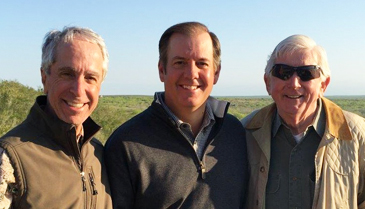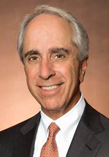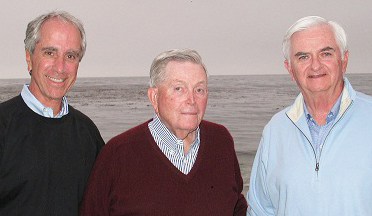© 2016 The Texas Lawbook.
By Mark Curriden
(Oct. 27) – To hear them tell it, ExxonMobil General Counsel Jack Balagia and recently retired AT&T GC Wayne Watts have played some mighty fierce golf matches.
“[Wayne] is certainly competitive with my golf game,” Balagia says. “He hits the ball a million miles, although getting it to go where he wants it to go can be problematic.”
Watts disagrees.
“Jack thinks he’s better at golf than I am, but he only thinks that,” Watts says, while sitting in his rocking chair in the middle of his garden in Boerne, Texas.
Eyewitnesses to their epic games remain tight-lipped.
“I have no comment,” says AT&T GC David McAtee. “I would not touch that if my life depended on it.”

The good news is that the duo who have managed two of the largest corporate legal departments in the world are going to face off on greens from Austin to San Antonio much more often.
Balagia turned 65 on Wednesday. This coming Monday, he officially retires as ExxonMobil’s 12th general counsel since the company – then known as Standard Oil Co. of New Jersey – was created by John D. Rockefeller in 1870.
ExxonMobil assistant general counsel Randall Ebner becomes the Irving-based company’s new chief legal officer on Nov. 1. Ebner was actually Balagia’s supervisor in the oil giant’s litigation department when Balagia joined the company in 1998.
“The great thing about this job is that you never know what the issues are going to be day to day,” Balagia says. “Oil spills, pipeline leaks, lawsuits, regulatory challenges.
“You never know what to expect when you walk in the door,” he says.
In an exclusive interview with The Texas Lawbook, Balagia says he probably would not retire from ExxonMobil right now if the company didn’t require mandatory retirement when its workers turn 65.
“I feel great. I love being a lawyer,” he says. “I definitely plan to do something, but I have made no commitments yet.”
Balagia agreed to co-teach a class on oil and gas law this coming spring at his alma mater, the University of Texas School of Law. Last November, Texas Supreme Court Chief Justice Nathan Hecht appointed him to serve on a 16-member commission charged with studying ways for legal services to be more affordable to small businesses and those in the middle class.

With 424 lawyers in 31 countries, ExxonMobil has one of the largest corporate legal departments in the world. Even so, Balagia worked diligently to get his team to function as a single operation.
“Jack opened doors and broke down walls under the concept of one global legal department supporting the whole company – no matter where we sit in offices or which division we work for,” ExxonMobil Upstream GC William Buck says.
“Jack makes everyone feel that they are part of the team and its successes,” Buck says.
Balagia is also a major advocate of diversity in the legal profession. He points out that more than 40 percent of the attorneys in ExxonMobil’s legal department are women and about one-fourth are ethnic minorities.
“We want the law department to reflect the communities in which we work,” he says. “I believe firmly that if your corporate legal department is diverse, then the outside counsel working for the company are more likely to be diverse, too.”
An Austin native who received his law degree from the University of Texas in 1976, Balagia clerked for U.S. District Judge W.M. Taylor Jr. for one year and then joined the Austin law firm McGinnis Lochridge & Kilgore, where he practiced oil and gas litigation for two decades. His hourly rate was $25 an hour.
In 1990, McGinnis Lochridge, which had Exxon as a client, expanded to Houston and sent Balagia there to represent the oil company. Over more than a decade, he defended Exxon in multiple jury trials and arbitrations.
ExxonMobil brought Balagia in-house in 1998, where he spent a dozen years in the litigation section. In 2010, Balagia was promoted to general counsel.
“Jack has the unique talent for getting everyone on the same page,” says retired ExxonMobil general counsel Charles Matthews, who was Balagia’s predecessor. “He has an amazing ability to get people to do what he needs them to do.
“I don’t know anyone who dislikes Jack,” he says.

McAtee, who followed Watts as the general counsel of AT&T, says Balagia handles highly complex and high-pressured demands with “warmth and apparent ease that is a credit not only to how smart he is, but to his character.”
“Jack is a unique talent and everything a general counsel should be,” McAtee says.
During his time at ExxonMobil, Balagia oversaw two multibillion-dollar lawsuits.
“There’s a saying around here that you cannot be general counsel if you haven’t lost a billion-dollar case,” Balagia says jokingly.
Two years after he joined ExxonMobil’s litigation department, the state of Alabama sued the Irving company on claims it had been defrauded of royalty money the energy firm owed it from the extraction of natural gas in the state.
An Alabama jury ordered ExxonMobil to pay $3.5 billion in December 2000. The verdict was reversed in 2002 and a new trial occurred in November 2003. The second jury awarded Alabama officials $64 million in actual damages and $11.8 billion in punitive damages.
Once again, ExxonMobil convinced the courts in 2007 to throw out all of the punitive damages.
In 2011, a Maryland jury awarded $495 million in actual damages and $1 billion in punitive damages to 160 families and small businesses that claimed they had suffered economic damages due to a gas leak. Baltimore Orioles owner Peter Angelos was the lead lawyer for the plaintiffs against ExxonMobil.
Two years later, the Maryland appellate courts tossed out all of the punitive damages and some of the compensatory damages.
“I have always been amazed at how calm Jack has always been when he’s involved in a big lawsuit,” Watts says. “No matter how much pressure he’s facing, Jack’s demeanor never changes.”
Balagia says he is proud of the fact that ExxonMobil, despite having more than 75,000 employees around the world, has avoided many of the legal problems under the Foreign Corrupt Practices Act and the False Claims Act that other global companies have faced.
“[ExxonMobil CEO] Rex [Tillerson] has stressed that our lawyers be involved early with complex issues so that we can address those issues before they become a legal problem,” Balagia says. “Our record of regulatory compliance has been outstanding.”
Balagia declines to discuss the current investigation by the New York attorney general into whether ExxonMobil misled investors and regulators about its knowledge and past research of climate change.
He readily admits, however, that ExxonMobil and other large companies are required to spend more and more time dealing with regulatory matters.
“Compliance demands have definitely increased,” he says. “The regulatory environment puts a lot more pressure on companies.”
With litigation pending in nearly every state in the U.S., ExxonMobil employs several hundred lawyers working at more than 100 law firms to handle its civil and regulatory disputes.
When Balagia became general counsel, about 60 percent of ExxonMobil’s legal spend went to outside counsel. Today, it is less than 50 percent, he says.
“We hire the best lawyers to help us for our legal needs, whether they are at Baker Botts or Fulbright or a boutique,” Balagia says. “I don’t pay attention to lawyer advertising in airports.
“I have never hired a lawyer because they were listed in some ranking, but I have hired lots of lawyers not on any lists,” he says.
Balagia says he plans to stay in Dallas until next fall, when he plans to move back to Houston to be closer to his grandchildren.
Colleagues say Balagia has many options. Some say he performs a mean Frank Sinatra and could dominate the karaoke circuit. Others say he should consider following in the steps of his predecessor, Matthews, by joining corporate boards (“Yes, if the right opportunity presented itself and I felt like I had something to contribute,” Balagia says).
“Because the general counsel of Exxon is the best legal job and deals with so many complex and fascinating issues that come across your desk, it is a hard thing to walk away from it,” says Matthews, who sits on the board of directors at Frost Bank and Trinity Industries.
“Jack is going to be in great demand,” Matthews says. “He’s going to have to sift through a lot of offers.”
© 2016 The Texas Lawbook. Content of The Texas Lawbook is controlled and protected by specific licensing agreements with our subscribers and under federal copyright laws. Any distribution of this content without the consent of The Texas Lawbook is prohibited.
If you see any inaccuracy in any article in The Texas Lawbook, please contact us. Our goal is content that is 100% true and accurate. Thank you.
